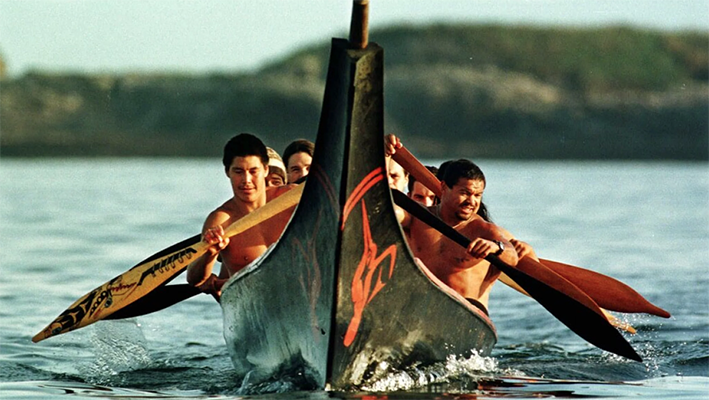||| FROM KNKX NPR |||
The long wait is over. A federal official has given the green light for members of the Makah tribe to resume exercising their treaty right to whaling, based on a request first made in 2005. Their last hunt took place in 1999.
With a waiver under the Marine Mammal Protection Act in hand, the tribe will be authorized to hunt and kill up to three eastern North Pacific gray whales per year over the next decade.
Their hunt could start as soon as this summer or fall, although the tribe said a hunt this fall or later is more likely. Makah officials must first secure a permit from the National Marine Fisheries Service.
The Tribe and officials from NOAA Fisheries must enter into a cooperative agreement honoring internationally established quotas under the Whaling Convention Act. And dozens of young men in the whaling crew need to be physically and spiritually ready.
Joy and relief
Janine Ledford, executive director of the Makah Cultural and Research Center in Neah Bay, recalled the feeling she had as a young woman witnessing the whale hunt in 1999. The 25 years that have passed since then have amplified that feeling.
“It’s actually pretty hard to put to words, but it’s monumental, it’s really incredible,” Ledford said in anticipation of the decision.
“When you’re resuming something that is so central and so important – that our ancestors never let us forget about.”
She said there is also sadness and frustration about the many people who died waiting to see the revival of the whale hunt. But there are equal numbers of young people who have been waiting and have set their sights on supporting it in some way.
“Everybody here is involved in one way or another. We’ve never lost sight of the importance of whales and whale hunting,” Ledford said. “You know, we weren’t hunting for roughly 80 years, but that didn’t mean that our community – that our tribe, you know – forgot how important whales are to us.”
Since 1999, the tribe has continued to nurture the whaling culture and customs as best they can, without actually going on a hunt. Stranded and entangled whales are sometimes brought to Makah beaches for traditional processing, as recently as in 2018 and 2020.
The hunt is to be conducted using traditional methods, such as hand-carved canoes and harpoons. As in 1999, Makah hunters will also use modern equipment, including motorized chase-boats and a high-powered rifle to quickly kill the whale after it is struck.
**If you are reading theOrcasonian for free, thank your fellow islanders. If you would like to support theOrcasonian CLICK HERE to set your modestly-priced, voluntary subscription. Otherwise, no worries; we’re happy to share with you.**








I have lost all respect for our tribal brothers with this act.It’s a flagrint Flap in the face of every non-tribal person in the world.This is outrageous, this is an embarrassment. Other tribes need to stand out because this is the worst public relations thing the Indian nations can do.Is this a payback for the small Pox?
Terrible news for the poor whales, who likely have intergenerational trauma from their previous slaughter and near extinction. This is indeed outrageous.
It’s almost a two centuries ago treaty right before powered boats and automatic high powered rifles were invented. Tribes can and do shoot the elk heads that are trying to become reestablished from the highways at Mt. Saint Helens National Monument … park rangers can’t interfere. Reportedly they tried to sell the last “legally” killed (not the one they illegally killed) gray whale to Japan whale meat wholesalers. Diets change, and it’s a real stretch to believe they still need whale as a necessary traditional diet.
The Boldt decision gave 50% of annual Washington State fish catches to the tribes, although Native Americans are less than 2% of Washington State’s population. No percentage is stated in the signed treaty. One federal judge decision and that’s decided perhaps forever.
Won’t happen, but since Native Americans were granted U.S. citizenship and equal rights are a hallmark (at least in theory) of U.S. citizenship, perhaps these special hunting and killing privileges granted centuries ago should undergo some updating and fundamental change.
I’m sure there are many who would disagree. So be it.
The Makah and the whales have an old, established relationship. Who are we to tell them what is right or wrong?
How many Gray whale calves are killed by Orcas during spring migration every year? Undoubtedly far more than two or three! Are we therefore censuring the Orca whales for their hunting? Insist that they all become pescatarians? (How’s that working out for the SRKWs by the way?)
How many whales are killed by ship strikes every year? Are we boycotting products transported by ship? Are we castigating shipping companies? Are we refusing to invest in companies that once profited from the whaling industry?
It’s time to rein in the holier-than-thou attitudes and leave the Makah people alone to practice their ancient life ways. If we pay attention, they might even have something to teach us about sustainability and survival as a culture. I expect there will be Makah people hunting whales from canoes long after the last Amazon Prime truck has rusted apart and “the cloud” refers only to water vapor in the air.
There is a line from a famous book that says something about removing the beam from one’s own eye before pointing out the speck in your neighbor’s.
Ken Wood: Famous book, indeed! It’s the New Testament (Matthew 7:5). And it’s ‘mote’, not ‘speck’.
I would strongly encourage folks to make a visit to Neah Bay and spend some time at the Makah Cultural and Research Center/Museum., to develop a greater understanding of the Makah people’s relationship with the whales.
From Captain Paul Watson, founder of the Captain Paul Watson Foundation:
“June 14, 2024
Re: Plans to Once Again Kill Whales by Members of the Makah Tribe
In 1995, I was invited by a concerned group of Makah elders who requested that we help them defend and protect the whales.
We agreed with those elders whose invitation we accepted that having the right to kill whales does not mean that it is right to kill whales.
I oppose the killing of whales by anyone, anywhere, for any reason, without discrimination.
The late Makah Elder Alberta Thompson told us that there was very little that is traditional about the plans to resurrect the killing of Gray whales by the Makah Tribe. The rituals have been abandoned and there is nothing traditional about using modern equipment especially a .50 calbre rifle. She said that at least these young whale hunter wannabes should speak our language before becoming thrill killers of whales.
Alberta Thompson spoke for the whales at the International Whaling Commission (IWC) meetings in Dublin, Ireland (1995), Aberdeen, Scotland (1996) and Monaco (1997). The U.S. government did not cover her expenses to defend whales, but the U.S. government covered the expenses of and subsidized the training of the whalers. So, we had Makah Elders opposed to the killing of whales that the U.S. delegation refused to give a hearing to, while supporting the whalers politically and financially. Who were we to trust? My allegiance was to the anti-whaling Elders who spoke for the whales without any financial motivation and not to the U.S. government sanctioned whalers with anti-tank guns.
We will continue to legally challenge the plans by the Makah Tribal Council to kill a species already suffering from habitat destruction and diminishment of food and we will consider returning to direct intervention like we did in 1998 and 1999 if invited to do so by at least six traditional Elders.
The slaughter of whales in a dying Ocean by anyone, anywhere, any place for any reason has no place in this world of 2024.”